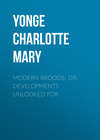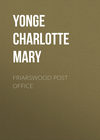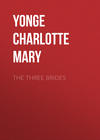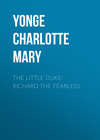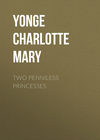Loe raamatut: «Hopes and Fears or, scenes from the life of a spinster», lehekülg 23
CHAPTER X
O ye, who never knew the joys
Of friendship, satisfied with noise,
Fandango, ball, and rout,
Blush, when I tell you how a bird
A prison, with a friend, preferred,
To liberty without.
—Cowper
Had Lucilla Sandbrook realized the effect of her note, she would never have dashed it off; but, like all heedless people, pain out of her immediate ken was nothing to her.
After the loving hopes raised by the curate’s report, and after her own tender and forgiving letter, Honor was pierced to the quick by the scornful levity of those few lines. Of the ingratitude to herself she thought but little in comparison with the heartless contempt towards Robert, and the miserable light-mindedness that it manifested.
‘My poor, poor child!’ was all she said, as she saw Phœbe looking with terror at her countenance; ‘yes, there is an end of it. Let Robert never vex himself about her again.’
Phœbe took up the note, read it over and over again, and then said low and gravely, ‘It is very cruel.’
‘Poor child, she was born to the Charteris nature, and cannot help it! Like seeks like, and with Paris before her, she can see and feel nothing else.’
Phœbe vaguely suspected that there might be a shadow of injustice in this conclusion. She knew that Miss Charlecote imagined Lucilla to be more frivolous than was the case, and surmised that there was more offended pride than mere levity in the letter. Insight into character is a natural, not an acquired endowment; and many of poor Honor’s troubles had been caused by her deficiency in that which was intuitive to Phœbe, though far from consciously. That perception made her stand thoughtful, wondering whether what the letter betrayed were folly or temper, and whether, like Miss Charlecote, she ought altogether to quench her indignation in contemptuous pity.
‘There, my dear,’ said Honor, recovering herself, after having sat with ashy face and clasped hands for many moments. ‘It will not bear to be spoken or thought of. Let us go to something else. Only, Phœbe, my child, do not leave her out of your prayers.’
Phœbe clung about her neck, kissed and fondled her, and felt her cheeks wet with tears, in the passionate tenderness of the returning caress.
The resolve was kept of not going back to the subject, but Honora went about all day with a soft, tardy step, and subdued voice, like one who has stood beside a death-bed.
When Phœbe heard those stricken tones striving to be cheerful, she could not find pardon for the wrong that had not been done to herself. She dreaded telling Robert that no one was coming whom he need avoid, though without dwelling on the tone of the refusal. To her surprise, he heard her short, matter-of-fact communication without any token of anger or of grief, made no remark, and if he changed countenance at all, it was to put on an air of gloomy satisfaction, as though another weight even in the most undesirable scale were preferable to any remnant of balancing, and compunction for possible injustice were removed.
Could Lucilla but have seen that face, she would have doubted of her means of reducing him to obedience.
The course he had adopted might indeed be the more excellent way in the end, but at present even his self-devotion was not in such a spirit as to afford much consolation to Honor. If good were to arise out of sorrow, the painful seed-time was not yet over. His looks were stern even to harshness, and his unhappiness seemed disposed to vent itself in doing his work after his own fashion, brooking no interference.
He had taken a lodging over a baker’s shop at Turnagain Corner. Honor thought it fair for the locality, and knew something of the people, but to Phœbe it was horror and dismay. The two small rooms, the painted cupboard, the cut paper in the grate, the pictures in yellow gauze, with the flies walking about on them, the round mirror, the pattern of the carpet, and the close, narrow street, struck her as absolutely shocking, and she came to Miss Charlecote with tears in her eyes, to entreat her to remonstrate, and tell Robin it was his duty to live like a gentleman.
‘My dear,’ said Honor, rather shocked at a speech so like the ordinary Fulmort mind, ‘I have no fears of Robert not living like a gentleman.’
‘I know—not in the real sense,’ said Phœbe, blushing; ‘but surely he ought not to live in this dismal poky place, with such mean furniture, when he can afford better.’
‘I am afraid the parish affords few better lodgings, Phœbe, and it is his duty to live where his work lies. You appreciated his self-denial, I thought? Do you not like him to make a sacrifice?’
‘I ought,’ said Phœbe, her mind taking little pleasure in those acts of self-devotion that were the delight of her friend. ‘If it be his duty, it cannot be helped, but I cannot be happy at leaving him to be uncomfortable—perhaps ill.’
Coming down from the romance of martyrdom which had made her expect Phœbe to be as willing to see her brother bear hardships in the London streets, as she had herself been to dismiss Owen the first to his wigwam, Honor took the more homely view of arguing on the health and quietness of Turnagain Corner, the excellence of the landlady, and the fact that her own cockney eyes had far less unreasonable expectations than those trained to the luxuries of Beauchamp. But by far the most efficient solace was an expedition for the purchase of various amenities of life, on which Phœbe expended the last of her father’s gift. The next morning was spent in great secrecy at the lodgings, where Phœbe was so notable and joyous in her labours, that Honor drew the conclusion that housewifery was her true element; and science, art, and literature only acquired, because they had been made her duties, reckoning all the more on the charming order that would rule in Owen Sandbrook’s parsonage.
All troubles and disappointments had faded from the young girl’s mind, as she gazed round exulting on the sacred prints on the walls, the delicate statuettes, and well-filled spill-holder and match-box on the mantelshelf, the solid inkstand and appurtenances upon the handsome table-cover, the comfortable easy-chair, and the book-cases, whose contents had been reduced to order due, and knew that the bedroom bore equal testimony to her skill; while the good landlady gazed in admiration, acknowledging that she hardly knew her own rooms, and promising with all her heart to take care of her lodger.
Alas! when, on the way to the station, Honor and Phœbe made an unexpected raid to bring some last improvements, Robert was detected in the act of undoing their work, and denuding his room of even its original luxuries. Phœbe spoke not, but her face showed her discomfiture, and Honora attacked him openly.
‘I never meant you to know it,’ he said, looking rather foolish.
‘Then to ingratitude you added treachery.’
‘It is not that I do not feel your kindness—’
‘But you are determined not to feel it!’
‘No, no! only, this is no position for mere luxuries. My fellow-curates—’
‘Will use such conveniences of life as come to them naturally,’ said Honor, who had lived long enough to be afraid of the freaks of asceticism. ‘Hear me, Robert. You are not wise in thrusting aside all that brings home to you your little sister’s love. You think it cannot be forgotten, but it is not well to cast away these daily memorials. I know you have much to make you severe—nay, morose—but if you become so, you will never do your work efficiently. You may repel, but never invite; frighten, but not soothe.’
‘You want me to think my efficiency dependent on arm-chairs and table-covers.’
‘I know you will be harder to all for living in needless discomfort, and that you will be gentler to all for constantly meeting tokens of your sister’s affection. Had you sought these comforts for yourself, the case would be different; but, Robert, candidly, which of you is the self-pleasing, which the mortified one, at this moment?’
Robert could not but look convicted as his eyes fell on the innocent face, with the tears just kept back by strong effort, and the struggling smile of pardon.
‘Never mind, Robin,’ said Phœbe, as she saw his air of vexation; ‘I know you never meant unkindness. Do as you think right, only pray think of what Miss Charlecote says.’
‘She has one thing more to say,’ added Honor. ‘Do you think that throwing aside Phœbe’s little services will make you fitter to go among the little children?’
There was no answer, but a reluctant approach to a smile gave Phœbe courage to effect her restorations, and her whispered ‘You will not disturb them?’ met with an affirmative satisfactory to herself.
Perhaps he felt as of old, when the lady of the Holt had struck him for his cruelty to the mouse, or expelled him for his bad language. The same temper remained, although self-revenge had become the only outlet. He knew what it was that he had taken for devoted self-denial.
‘Yes, Robin,’ were Miss Charlecote’s parting words, as she went back to days of her own long past. ‘Wilful doing right seldom tends to good, above all when it begins by exaggeration of duty.’
And Robert was left with thoughts such as perchance might render him a more tractable subordinate for Mr. Parsons, instead of getting into training for the Order of St. Dominic.
Phœbe had to return less joyfully than she had gone forth. Her first bright star of anticipation had faded, and she had partaken deeply of the griefs of the two whom she loved so well. Not only had she to leave the one to his gloomy lodgings in the City, and the toil that was to deaden suffering, but the other must be parted with at the station, to return to the lonely house, where not even old Ponto would meet her—his last hour having, to every one’s grief, come in her absence.
Phœbe could not bear the thought of that solitary return, and even at the peril of great disappointment to her sisters, begged to sleep that first night at the Holt, but Honor thanked her, and laughed it off: ‘No, no! my dear, I am used to be alone, and depend upon it, there will be such an arrear of farm business for me, that I should hardly have time to speak to you. You need not be uneasy for me, dear one, there is always relief in having a great deal to do, and I shall know you are near, to come if I want you. There’s a great deal in that knowledge, Phœbe.’
‘If I were of any use—’
‘Yes, Phœbe, this visit has made you my friend instead of my playfellow.’
Phœbe’s deepening colour showed her intense gratification. ‘And there are the Sundays,’ added Honor. ‘I trust Miss Fennimore will let you come to luncheon, and to the second service with me.’
‘I will try very hard!’
For Phœbe could not help feeling like the canary, who sees his owner’s hand held out to catch him after his flight, or the pony who marks his groom at the gate of the paddock. Cage and rein were not grievous, but liberty was over, and free-will began to sink into submission, as the chimneys of home came nearer, even though the anticipation of her sister’s happiness grew more and more on her, and compensated for all.
Shrieks of ecstasy greeted her; she was held as fast as though her sisters feared to lose her again, and Miss Fennimore showed absolute warmth of welcome. Foreign tongues were dispensed with, and it was a festival evening of chatter, and display of purchases, presents, and commissions. The evidences of Phœbe’s industry were approved. Her abstracts of her reading, her notes of museums and exhibitions, her drawing, needlework, and new pieces of music, exceeded Miss Fennimore’s hopes, and appalled her sisters.
‘You did all that,’ cried Bertha, profiting by Miss Fennimore’s absence; ‘I hope to goodness she won’t make it a precedent.’
‘Wasn’t it very tiresome?’ asked Maria.
‘Sometimes; but it made me comfortable, as if I had a backbone for my day.’
‘But didn’t you want to feel like a lady?’
‘I don’t think I felt otherwise, Maria.’
‘Like a grown-up lady, like mamma and my sisters?’
‘O examples!’ cried Bertha. ‘No wonder Maria thinks doing nothing the great thing to grow up for. But, Phœbe, how could you be so stupid as to go and do all this heap? You might as well have stayed at home.’
‘Miss Fennimore desired me!’
‘The very reason why I’d have read stories, and made pictures out of them, just to feel myself beyond her talons.’
‘Talents, not talons,’ said Maria. ‘Cats have talons, people have talents.’
‘Sometimes both, sometimes neither,’ observed Bertha. ‘No explanation, Phœbe; what’s the use? I want to know if Owen Sandbrook didn’t call you little Miss Precision?’
‘Something like it.’
‘And you went on when he was there?’
‘Generally.’
‘Oh! what opportunities are wasted on some people. Wouldn’t I have had fun! But of course he saw you were a poor little not-come-out thing, and never spoke to you. Oh! if Miss Charlecote would ask me to London!’
‘And me!’ chimed in Maria.
‘Well, what would you do?’
‘Not act like a goose, and bring home dry abstracts. I’d make Miss Charlecote take me everywhere, and quite forget all my science, unless I wanted to amaze some wonderful genius. Oh dear! won’t I make Augusta look foolish some of these days! She really thinks that steel attracts lightning! Do you think Miss Charlecote’s society will appreciate me, Phœbe?’
‘And me?’ again asked Maria.
Phœbe laughed heartily, but did not like Bertha’s scoffing mirth at Maria’s question. Glad as she was to be at home, her glimpse of the outer world had so enlarged her perceptions, she could not help remarking the unchildlike acuteness of the younger girl, and the obtuse comprehension of the elder; and she feared that she had become discontented and fault-finding after her visit. Moreover, when Bertha spoke much English, a certain hesitation occurred in her speech which was apt to pass unnoticed in her foreign tongues, but which jarred unpleasantly on her sister’s ear, and only increased when noticed.
At nine, when Phœbe rose as usual to wish good night, Miss Fennimore told her that she need not for the future retire before ten, the hour to which she had of late become accustomed. It was a great boon, especially as she was assured that the additional hour should be at her own disposal.
‘You have shown that you can be trusted with your time, my dear. But not to-night,’ as Phœbe was turning to her desk; ‘remember how long I have suffered a famine of conversation. What! were you not sensible of your own value in that respect?’
‘I thought you instructed me; I did not know you conversed with me.’
‘There’s a difference between one susceptible of instruction, and anything so flippant and volatile as Bertha,’ said Miss Fennimore, smiling. ‘And poor Maria!’
‘She is so good and kind! If she could only see a few things, and people, and learn to talk!’
‘Silence and unobtrusiveness are the only useful lessons for her, poor girl!’ then observing Phœbe’s bewildered looks, ‘My dear, I was forced to speak to Bertha because she was growing jealous of Maria’s exemptions; but you, who have been constantly shielding and supplying her deficiencies, you do not tell me that you were not aware of them?’
‘I always knew she was not clever,’ said Phœbe, her looks of alarmed surprise puzzling Miss Fennimore, who in all her philosophy had never dreamt of the unconscious instinct of affection.
‘I could not have thought it,’ she said.
‘Thought what? Pray tell me! O what is the matter with poor Maria?’
‘Then, my dear, you really had never perceived that poor Maria is not—has not the usual amount of capacity—that she cannot be treated as otherwise than deficient.’
‘Does mamma know it?’ faintly asked Phœbe, tears slowly filling her eyes.
Miss Fennimore paused, inwardly rating Mrs. Fulmort’s powers little above those of her daughter. ‘I am not sure,’ she said; ‘your sister Juliana certainly does, and in spite of the present pain, I believe it best that your eyes should be opened.’
‘That I may take care of her.’
‘Yes, you can do much in developing her faculties, as well as in sheltering her from being thrust into positions to which she would be unequal. You do so already. Though her weakness was apparent to me the first week I was in the house, yet, owing to your kind guardianship, I never perceived its extent till you were absent. I could not have imagined so much tact and vigilance could have been unconscious. Nay, dear child, it is no cause for tears. Her life may perhaps be happier than that of many of more complete intellect.’
‘I ought not to cry,’ owned Phœbe, the tears quietly flowing all the time. ‘Such people cannot do wrong in the same way as we can.’
‘Ah! Phœbe, till we come to the infinite, how shall the finite pronounce what is wrong?’
Phœbe did not understand, but felt that she was not in Miss Charlecote’s atmosphere, and from the heavenly, ‘from him to whom little is given, little will be required,’ came to the earthly, and said, imploring, ‘And you will never be hard on her again!’
‘I trust I have not been hard on her. I shall task her less, and only endeavour to give her habits of quiet occupation, and make her manners retiring. It was this relaxation of discipline, together with Bertha’s sad habit of teasing, which was intolerable in your absence, that induced me to explain to her the state of the case.’
‘How shocked she must have been.’
‘Not quite as you were. Her first remark was that it was as if she were next in age to you.’
‘She is not old enough to understand.’
The governess shook her head. ‘Nay, when I found her teasing again, she told me it was a psychological experiment. Little monkey, she laid hold of some books of mine, and will never rest till she has come to some conclusion as to what is wanting in Maria.’
‘Too young to feel what it means,’ repeated Phœbe.
She was no great acquisition as a companion, for she neither spoke nor stirred, so that the governess would have thought her drowsy, but for the uprightness of the straight back, and the steady fold of the fingers on the knee. Much as Miss Fennimore detested the sight of inaction, she respected the reverie consequent on the blow she had given. It was a refreshing contrast with Bertha’s levity; and she meditated why her system had made the one sister only accurate and methodical, while the other seemed to be losing heart in mind, and becoming hard and shrewd.
There was a fresh element in Phœbe’s life. The native respect for ‘the innocent’ had sprung up within her, and her spirit seemed to expand into protecting wings with which to hover over her sister as a charge peculiarly her own. Here was the new impulse needed to help her when subsiding into the monotony and task-work of the schoolroom, and to occupy her in the stead of the more exciting hopes and fears that she had partaken in London.
Miss Fennimore wisely relaxed her rule over Phœbe, since she had shown that liberty was regarded as no motive for idleness; so though the maiden still scrupulously accomplished a considerable amount of study, she was allowed to portion it out as suited her inclination, and was no longer forbidden to interrupt herself for the sake of her sisters. It was infinite comfort to be no longer obliged to deafen her ears to the piteous whine of fretful incapacity, and to witness the sullen heaviness of faculties overtasked, and temper goaded into torpor. The fact once faced, the result was relief; Maria was spared and considered, and Phœbe found the governess much kinder, not only to her sister but to herself. Absence had taught the value of the elder pupil, and friendly terms of equality were beginning to be established.
Phœbe’s freedom did not include solitary walks, and on weekdays she seldom saw Miss Charlecote, and then only to hear natural history, the only moderately safe ground between the two elder ladies. What was natural science with the one, was natural history with the other. One went deep in systems and classifications, and thrust Linnæus into the dark ages; the other had observed, collected, and drawn specimens with the enthusiasm of a Londoner for the country, till she had a valuable little museum of her own gathering, and was a handbook for the county curiosities. Star, bird, flower, and insect, were more than resources, they were the friends of her lonely life, and awoke many a keen feeling of interest, many an aspiration of admiring adoration that carried her through her dreary hours. And though Miss Fennimore thought her science puerile, her credulity extensive, and her observations inaccurate, yet she deemed even this ladylike dabbling worthy of respect as an element of rational pleasure and self-training, and tried to make Bertha respect it, and abstain from inundating Miss Charlecote with sesquipedalian names for systems and families, and, above all, from her principal delight, setting the two ladies together by the ears, by appealing to her governess to support her abuse of Linnæus as an old ‘dictionary-maker,’ or for some bold geological theory that poor Honor was utterly unprepared to swallow.
Bertha was somewhat like the wren, who, rising on the eagle’s head, thought itself the monarch of the birds, but Honor was by no means convinced that she was not merely blindfolded on the back of Clavileno Aligero. There was neither love nor admiration wasted between Honor and Miss Fennimore, and Phœbe preferred their being apart. She enjoyed her Sunday afternoons, short enough, for school must not be neglected, but Honor shyly acceded to Phœbe’s entreaty to be allowed to sit by her class and learn by her teaching.
It was an effort. Honor shrank from exposing her own misty metaphors, hesitating repetitions, and trivial queries to so clear a head, trained in distinct reasoning, but it was the very teaching that the scientific young lady most desired, and she treasured up every hint, afterwards pursuing the subject with the resolution to complete the chain of evidence, and asking questions sometimes rather perplexing to Honor, accustomed as she was to take everything for granted. Out came authorities, and Honor found herself examining into the grounds of her own half-knowledge, gaining fresh ideas, correcting old ones, and obtaining subjects of interest for many an hour after her young friend had left her.
While, at home, Phœbe, after running the gauntlet of Bertha’s diversion at her putting herself to school, when Scripture lessons were long ago done with, would delight Maria with long murmuring discourses, often stories about the scholars, but always conveying some point of religious instruction. It was a subject to which Maria was less impervious than to any other; she readily learned to croon over the simple hymns that Phœbe brought home, and when once a Scripture story had found entrance to her mind, would beg to have it marked in her Bible, and recur to it frequently.
Miss Fennimore left her entirely to Phœbe at these times, keeping Bertha from molesting her by sarcastic queries, or by remarks on the sing-song hymns, such as made Phœbe sometimes suspect that Maria’s love for these topics rendered them the more distasteful to the younger girl. She tried to keep them as much sheltered as possible, but was still sometimes disconcerted by Bertha’s mischievous laugh, or by finding Miss Fennimore’s eyes fixed in attention.
Phœbe’s last hour on these evenings was spent in laying up her new lore in her diligently kept note-book, weighing it and endeavouring to range it in logical sequence, which she had been duly trained to consider the test of reasoning. If she sometimes became bewildered, and detected insufficient premises for true conclusions, if she could not think allegory or analogy the evidence it was made at the Sunday-school, and which Miss Charlecote esteemed as absolute proof, her sound heart and loving faith always decided her that she should discover the link in time; and the doctrine had too strong a hold on her convictions and affections for her to doubt that the chain of argument existed, though she had not yet found it. It was not the work for which so young a head was intended, and perhaps it was well that she was interrupted by the arrival at home of the heads of the family.
Augusta and her husband were to spend the winter abroad; Juliana had met some friends, whom she had accompanied to their home, and though she had exacted that Phœbe should not come out, yet the eldest daughter at home was necessarily brought somewhat forward. Phœbe was summoned to the family meals, and went out driving with her mother, or riding with her father, but was at other times in the schoolroom, where indeed she was the most happy.
The life down-stairs was new to her, and she had not been trained to the talk there expected of her. The one event of her life, her visit to London, gave evident dissatisfaction. There were growls whenever Robert was mentioned, and Phœbe found that though permission had been given for his taking the curacy, it had been without understanding his true intentions with regard to Whittingtonia. Something had evidently passed between him and his father and brother, while on their way through London, which had caused them to regard him as likely to be a thorn in their side; and Phœbe could not but fear that he would meet them in no spirit of conciliation, would rather prefer a little persecution, and would lean to the side of pastoral rather than filial duty, whenever they might clash. Even if he should refrain from speaking his full mind to his father, he was likely to use no precautions with his brother, and Phœbe was uneasy whenever either went up for their weekly visit of inspection at the office.
Her mother gently complained. ‘Honora Charlecote’s doing, I suppose. He should have considered more! Such a wretched place, no genteel family near! Your papa would never let me go near it. But he must buy an excellent living soon, where no one will know his connection with the trade.’
The only sympathy Phœbe met with at home on Robert’s ordination, was in an unexpected quarter. ‘Then your brother has kept his resolution,’ said Miss Fennimore. ‘Under his reserve there is the temper that formed the active ascetics of the middle ages. His doctrine has a strong mediæval tinge, and with sufficient strength of purpose, may lead to like results.’
When Phœbe proudly told Miss Charlecote of this remark, they agreed that it was a valuable testimony, both to the doctrines and the results. Honor had had a letter from Robert, that made her feel by force of contrast that Owen was more than three years from a like conception of clerical duty.
The storm came at last. By order of the Court of Chancery, there was put up for sale a dreary section of Whittingtonia, in dire decay, and remote from civilization. The firm of Fulmort and Son had long had their eyes on it, as an eligible spot for a palace for the supply of their commodity; and what was their rage when their agent was out-bidden, and the tenements knocked down to an unknown customer for a fancy price! After much alarm lest a rival distiller should be invading their territory, their wrath came to a height when it finally appeared that the new owner of the six ruinous houses in Cicely Row was no other than the Reverend Robert Mervyn Fulmort, with the purpose of building a church and schools for Whittingtonia at his own expense.
Mervyn came home furious. High words had passed between the brothers, and his report of them so inflamed Mr. Fulmort, that he inveighed violently against the malice and treachery that scrupled not to undermine a father. Never speaking to Robert again, casting him off, and exposing the vicar for upholding filial insolence and undutifulness, were the mildest of his threats. They seemed to imagine that Robert was making this outlay, supposing that he would yet be made equal in fortune by his father to the others, and there was constant repetition that he was to expect not a farthing—he had had his share and should have no more. There was only a scoff at Phœbe’s innocence, when she expressed her certainty that he looked for no compensation, knowing that he had been provided for, and was to have nothing from his father; and Phœbe trembled under such abuse of her favourite brother, till she could bear it no longer, and seizing the moment of Mervyn’s absence, she came up to her father, and said, in as coaxing a tone as she could, ‘Papa, should not every one work to the utmost in his trade?’
‘What of that, little one?’
‘Then pray don’t be angry with Robert for acting up to his,’ said Phœbe, clasping her hands, and resting them fondly on his shoulder.
‘Act up to a fool’s head! Parsons should mind their business and not fly in their fathers’ faces.’
‘Isn’t it their work to make people more good?’ continued Phœbe, with an unconscious wiliness, looking more simple than her wont.
‘Let him begin with himself then! Learn his duty to his father! A jackanapes; trying to damage my business under my very nose.’
‘If those poor people are in such need of having good done to them—’
‘Scum of the earth! Much use trying to do good to them!’
‘Ah! but if it be his work to try? and if he wanted a place to build a school—’
‘You’re in league with him, I suppose.’
‘No, papa! It surprised me very much. Even Mr. Parsons knew nothing of his plans, Robert only wrote to me when it was done, that now he hoped to save a few of the children that are turned out in the streets to steal.’
‘Steal! They’ll steal all his property! A proper fool your uncle was to leave it all to a lad like that. The sure way to spoil him! I could have trebled all your fortunes if that capital had been in my hands, and now to see him throw it to the dogs! Phœbe, I can’t stand it. Conscience? I hate such coxcombry! As if men would not make beasts of themselves whether his worship were in the business or not.’
‘Yes!’ ventured Phœbe, ‘but at least he has no part in their doing so.’
‘Much you know about it,’ said her father, again shielding himself with his newspaper, but so much less angrily than she had dared to expect, that even while flushed and trembling, she felt grateful to him as more placable than Mervyn. She knew not the power of her own sweet face and gently honest manner, nor of the novelty of an attentive daughter.












